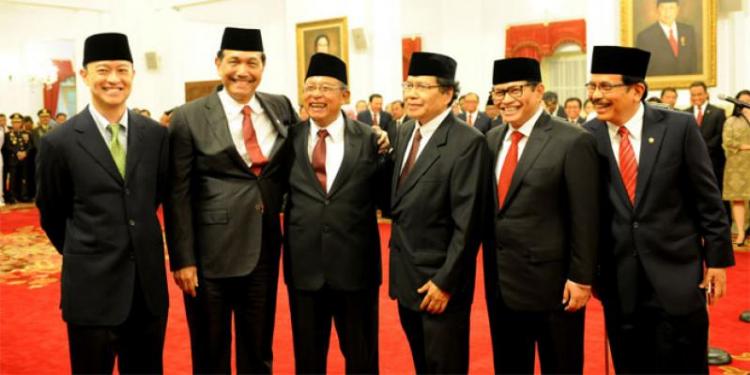Weekly Analysis: Reshuffle for Party
Fri, 08/14/2015 - 00:00

President Joko Widodo finally reshuffled his cabinet. A number of ministers or minister-level officials were replaced or restationed. Coordinating Minister on Politics (Menkopolhukam) Tedjo Edhy Purdijanto was replaced by Luhut Binsar Panjaitan who is still keeping his previous post as chief of the presidential staff; Coordinating Minister on Maritime Indroyono Soesilo was replaced by Rizal Ramli; Coordinating Minister on Economy Sofyan Djalil was replaced by Darmin Nasution with Sofyan Djalil restationed as Head of Development Planning Agency (Bappenas) replacing Andrinof Chaniago; Trade Minister Rahmat Gobel was replaced by Thomas Lembong; and Cabinet Secretary Andi Widjojanto was replaced by Pramono Anung.
In fact, a cabinet reshuffle was first proposed during the congress of the ruling party PDI-P in Bali. (http://www.solopos.com/2015/05/04/reshuffle-kabinet-jokowi-pdip-akui-reshuffle-kabinet-usulan-kongres-bali-600880) The proposal was backed by KIH (Great Indonesia Coalition), a coalition of parties that support President Jokowi's administration. Chairman of PKPI (Justice and Unity Party) Lt. Gen. (ret) Sutiyoso revealed that KIH's proposal was presented directly to the president during a meeting. (http://www.cnnindonesia.com/politik/20150504203709).
During his presidential address at the annual session of the DPR / MPR / DPD President Jokowi explained that the purpose of a cabinet reshuffle is to improve the performance of government. Jokowi admitted there are still many obstacles to his cabinet's programs; including economic instability, inequality, and corruption. (http://www.merdeka.com/politik/di-sidang-tahunan-mpr-jokowi-jelaskan-alasan-lakukan-reshuffle.html)
The president explicitly acknowledged that corruption is a major problem to his program. However this reshuffle does not reflect his concerns and reorganize ministries directly related to the efforts of eradicating corruption, including the Minister of Law and Human Rights (Menkumham) – disregarding strong public call for Jokowi to replace Minister Yasonna Laoly. The minister had repeatedly taken opposing position and policy to the president's efforts to eradicate corruption, including his policy to award remission for corruptors.
The president's decision to reshuffle his cabinet appear to address only two issues. First, to address economic challenges. The replacement and restationing of ministers on economy were intended to overcome pressures from global economy crisis which had had direct impacts on national economy, including the depleting currency. Second, to accommodate interests of the parties supporting his administration, primarily PDI-P, to secure more ministerial position in the cabinet.
Another controversy that had been highlighted about the reshuffle is the absence of the Corruption Eradication Commission (KPK) and the Financial Transaction Reports and Analysis Center (PPATK) during the process. Jokowi had abandoned an encouraging tradition that he initiated when he first create his cabinet. The involvement of KPK and PPATK would have helped to guarantee that his subordinates have good track records, and it would also improve public confidence in his new look cabinet.***










